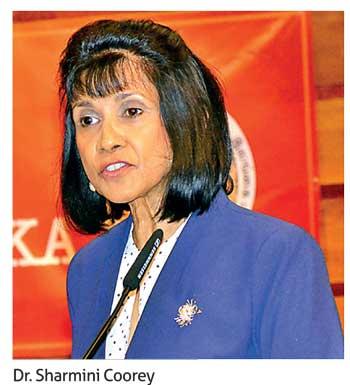Reply To:
Name - Reply Comment

By Shabiya Ali Ahlam
 The economic crisis in Sri Lanka may seem to have mellowed from what it was when it erupted in 2022 but the island nation still stands on a knife edge and there’s simply no room for setting off policy reversals, asserted a top economist, yesterday.
The economic crisis in Sri Lanka may seem to have mellowed from what it was when it erupted in 2022 but the island nation still stands on a knife edge and there’s simply no room for setting off policy reversals, asserted a top economist, yesterday.
Presidential Advisor and former International Monetary Fund Director Dr. Sharmini Coorey stressed the need for Sri Lanka to set itself on a road to sustained growth and increasing prosperity, an endeavour that is easier said than done.
For years, if not decades, Sri Lanka has recognised the necessity of achieving sustained growth, implementing fiscal discipline, fostering an open trade environment that stimulates exports, cultivating competitive markets, modernising labor laws and developing adequate infrastructure, among other objectives. Regrettably, none of these aspirations have materialised.
“I believe that our fundamental problem is poor governance. Unless we address governance problems head-on, we will never durably overcome economic problems and prosper.
My thesis today is that when we discuss economic policies, we should focus more squarely on the governance around those policies and not just on the policies themselves,” said Dr. Coorey.
The senior economist expressed her insights during the 73rd Anniversary Oration of the Central Bank of Sri Lanka, held in Colombo yesterday. Her presentation focused on the theme ‘The Way Forward: Price Stability and Prosperity Require Good Governance’.
During her address, Dr. Coorey pointed out the need for the Sri Lankan authorities to be more explicit, not just about economic policies but also about the process by which those policies are decided and implemented.
“It is very likely that if we improve the process, that is we make policymaking and implementation more accountable, transparent and adhere to the rule of law and so on, the resulting policies will improve as well,” she said. Dr. Coorey also noted that by having good policymaking processes and strong institutions, good policies would continue, even if the politics is bad.
She acknowledged that getting governance right is no simple task, as it requires sustained social pressure and political will. Dr. Coorey observed that the challenge for Sri Lanka is that if it is to avoid repeating the mistakes of the past, the authorities need to step up efforts to ensure that the policymaking and implementation processes and institutions obey the principles of good governance. She stressed that efforts must be taken to make certain that the policies serve the interests of not just a small group but of all members of society.